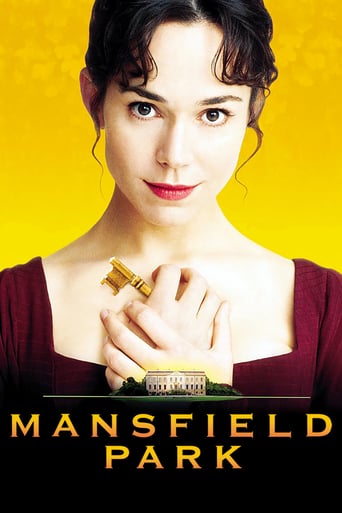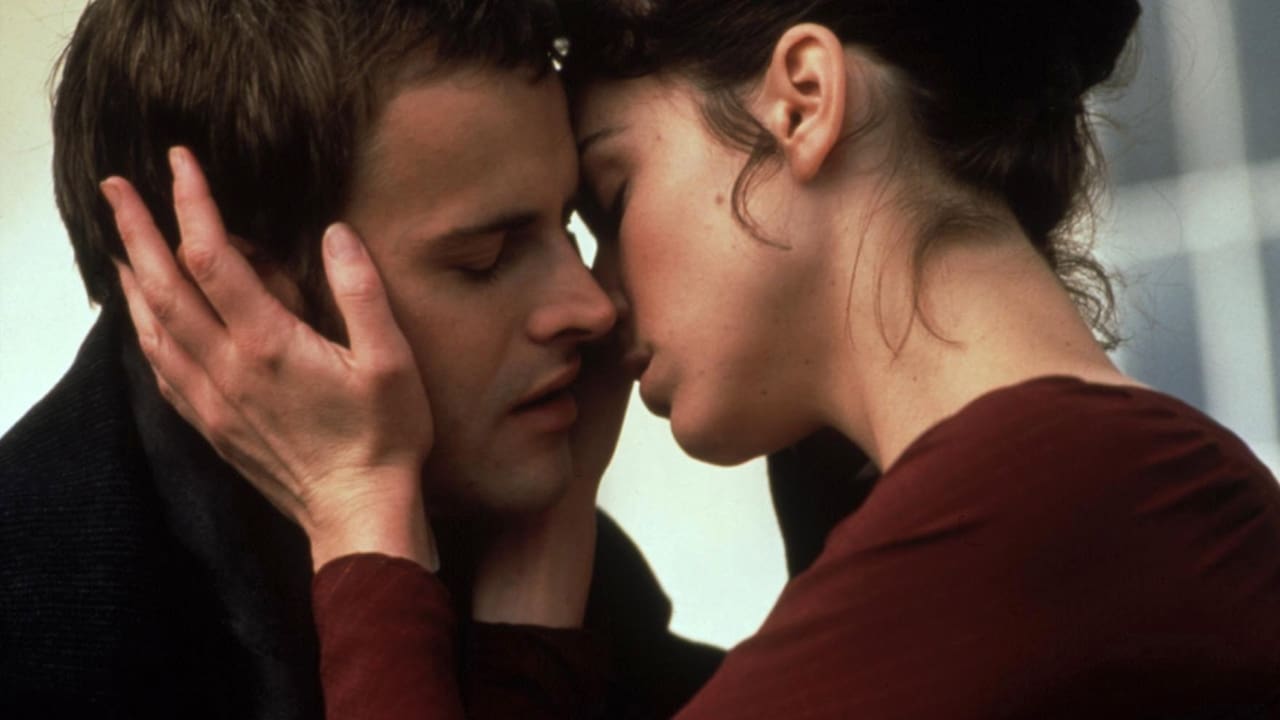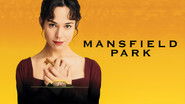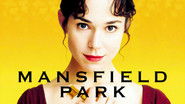Red-125
Mansfield Park (1999) was written and directed by Patricia Rozema. It's based on Jane Austen's novel. Frances O'Connor stars as Fanny Price, the protagonist of the novel. Pride and Prejudice and Sense and Sensibility are considered Jane Austen's two best works. Mansfield Park is down a rung on the ladder along with Persuasion and Emma. However, Jane Austen may well be the world's greatest English-language novelist, so even her less dazzling novels are read, and re-read, to this day.The film version rises and falls on the character of Fanny Price, the poor relation who is sent to rich relatives who live at Mansfield Park. The plot revolves around Fanny, and Frances O'Connor brings her alive. (At age 32, O'Connor was chronologically too old for the part, but she has a very vital, youthful quality, and she looks perfect in the role.) Not only does O'Connor do great work, but the supporting cast is excellent, and the production values are high.However, a controversy arises because director Rozema has chosen to subtly shift the characters and the sense of the novel to add incidents from Austen's own life, and to include a moral discussion about slavery. (The slave trade in England was outlawed in 1808, but slavery itself was not outlawed until 1833.)As cited in Wikipedia, "The result is a film that retains the core character evolution and series of events of Jane Austen's novel, but in other ways, some critics claim, stresses its themes and ideas differently. The plot changes the moral message of Austen's novel, and makes the story a critique of slavery rather than a conservative critique of the "modern." In the novel Fanny's passivity and moral stance are seen as virtues but these aspects of her character are missing from the film." I refer you to the complete article in Wikipedia, but this paragraph is the core of it.The question for me becomes, "Can scriptwriter Rozema improve on Jane Austen? Should director Rozema allow her to do this?" That's not an easy question, and I don't have an easy answer.This film was made for the large screen. We saw it on the small screen, and it worked pretty well. Whether it is or isn't what Jane Austen had in mine, it's a very good movie, and worth seeking out.
Ben Davis
It's like Sense and Sensibility, if Sense and Sensibility was less lighthearted and perhaps more poorly constructed. Don't get me wrong, I liked this movie, I just had a couple of problems with it. There are several points in the film where the main character, Fanny Price, is reading letters that she wrote to her sister and they are only there to explain exactly what is happening to the audience and it rubbed me the wrong way. Thankfully it didn't happen too much though. I also didn't like the end of the film. It wrapped up way too quickly. I was honestly shocked when I realized the movie was ending. It felt like they tried to include too much content into too short of a run time, and it was really noticeable to me. I would have definitely preferred a longer movie, as long as they used that time to develop what was happening more. This movie isn't without pros though. The acting and writing are both great and the cinematography was pretty decent as well. I imagine fans of Jane Austen as well as average film goers will enjoy it. 6.6/10
secondtake
Mansfield Park (1999)A remarkably clear-headed film that make Jane Austen real and alive. The heroine here is perhaps even a bit like Austen—though the actress is prettier, by all accounts—and it includes letters read by the character that are seemingly Austen's words. But what the cast and director Patricia Rozema pull off here is fabulous. There is no one reason this movie works so well, except of course the really scintillating, funny writing of Austen herself. The lead character is Fanny Price, played with true joy, angst, and subtle wit by Frances O'Connor. The two men who court her on and off are strong enough as men to be convincing, but they are perfectly still young men, barely more than boys in years, and they have those youthful flaws. Which is part of the fodder for Austen's wit.And social observation. If you don't quite catch the way she plays social classes against each other you miss part of the substance. It isn't just that the poor niece ends up at the rich uncle's house, but that this same niece has the perception to see through their facades. And to keep mum until just the right moment.This isn't a liberation film where the woman charges to victory in a big speech or by a power play. Instead—and this is one reason Austen is still readable today—the woman simply comments on the issues in a way that makes clear her more advanced views, and the obstacles slowly fall away through outside circumstances (rather than her own doing). The passivity of Fanny Price might bother some people, but that's exactly her role, as a character, in this pageant.One last point—slavery. This is the one novel of Austen's that gets her in trouble for her languid views on the uncle's use of slaves in the West Indies. The movie seems to twist this into a more modern condemnation, which helps us stay sympathetic to the whole shebang. There is even an added scene of sketches (done in a way rather like Goya's socially critical drawings of the same time, with some Kara Walker thrown in) which make clear the crisis at hand.If you want to dip into Austen through a movie, choose between this and the 2005 "Pride and Prejudice" and you won't be disappointed. Of course, if you want to read the book—that's even better. More modern and fresh than it "should" be for 200 years ago.
petitchatnoir
*MAY CONTAIN SPOILERS (but not much)*Over the years, we've seen Austen stories adapted for screen, many with liberties taken for the sake of expediency or artistic license. This film uses the title and characters from a wonderful, thought-provoking story and alters them beyond recognition. It also eliminates some key figures and plot completely (her relationship with her brother William is essential to the story, and he's not even alluded to in this film). Many of Fanny's behaviors (pique made obvious to visitors and her "superiors", her feet up on a chair in a non-private room, déshabillé with a near stranger) and statements are so thoroughly current-day and not in keeping with the shy, insecure Fanny Price of Austen's book that they are as much a distraction as a ringing cell phone inserted into a scene would be. There's also a great deal of sexualization of the characters which is superfluous and, again, distracting. It's not clear what story Ms. Rozema wanted to tell here but it surely was not Mansfield Park.



 AD
AD





